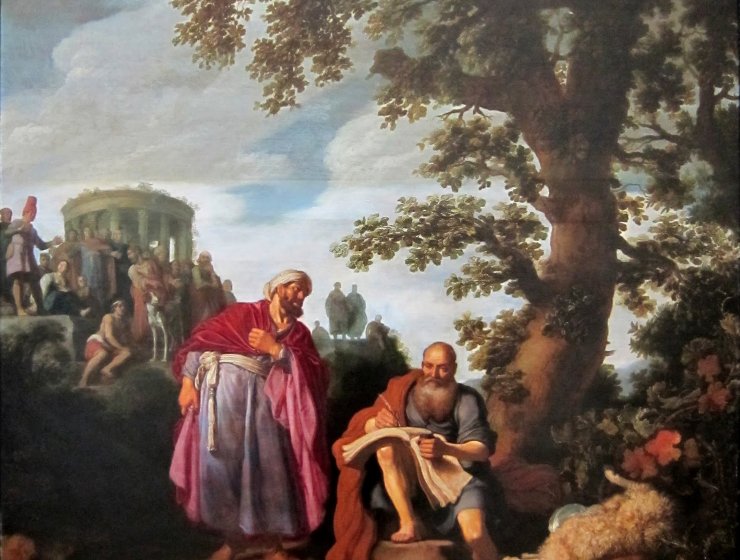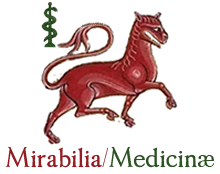
-Index-
Editorial: IV UNESC Seminar of Medical Humanities
Hélio ANGOTTI NETO
Original title: Editorial: IV Seminário UNESC de Humanidades Médicas
This volume of Mirabilia/Medicinæ brings two articles about the Hippocratic legacy. The first one was presented in the IV UNESC Seminar of Medical Humanities, and the second article brings a broad perspective of the many links between Medicine and Classical Philosophy.
The Medical-Patient Relationship in the Hippocratic Works: Ancient Medicine; Airs, Waters, and Places; Epidemy I and III; Precepts.
Kaio Cezar Gomes PESSIM, Hélio ANGOTTI NETO
Original title: A Relação Médico-Paciente na Obra Hipocrática: Medicina Antiga; Ares, Líquidos e Locais; Epidemia I e III; Preceitos.
The origin of Ocidental Medicine occurs in Ancient Greece with the Hippocratic School, when the technical and ethical principles for healthcare that still endure were created. Our objective is to correlate Hippocratic original excerpts on medical ethics with contemporary professional and ethic parameters, showing the link between the origin of western medicine and its contemporary practice. The material of this work derives from the first volume of Hippocratic writings form the Loeb Classical Library, published by Harvard, and compared with Spanish and Portuguese translations together with the original Greek excerpts. The original excerpts from the Hippocratic writings were selected according to the relation observed with medical-patient relationship and contemporary aspects professionalism. The Hippocratic work, here exposed, shows professional and ethical aspects that remain valid and comprehensible according to contemporary parameters observed in medical practice, which can be seen in ethical works like the Medical Code of Ethics, from the Federal Council of Medicine, in Brazil.
Medicin and Philosophy in Direct Dialectic Relation During the Classical and Late Antiquity
Sophia KARYMPALI-KYRIAZIS
Original title: Medicina e Filosofia em Relação Dialética Direta Durante a Antiguidade Clássica e Tardia
Medicine and Philosophy, in classical antiquity mainly, coexisted and joined hands as activities of the human intellect, with one exerting fruitful influence on the other in the course of time. The influence of philosophy on ancient medicine is generally accepted, as the theories of pre-Socratic philosophers from the 6th century BC for the interpretation of the world and human nature were the main inspiration for the formulation of the first medical texts. Natural philosophers from Ionia, such as Thales of Miletus, Anaximander, Anaximenes and Heraclitus, through their theories, laid the foundations towards future medical advances. Hippocrates of Kos, with his medical treatises in “Corpus Hippocraticum” was greatly influenced by the philosophical thought. Hippocrates is considered the “father of medicine” because he broadened the medical knowledge of his time and laid the foundations of medicine as science, releasing it from magic and superstitions. Plato and Aristotle refer to Hippocrates in their works and speak with respect about him acknowledging his enormous contribution to the healing of serious diseases. In the ancient world, Asclepius, who was considered a great healer of many serious diseases, was worshiped as the patron god of medicine. In his honor temples were erected and next to them great therapeutic centers, the well known “Asclepieia”, scattered in many cities of Ancient Greece and Asia Minor. In the 5th, 4th and 3rd century BC there are great medical schools that operate, founded by famous medico-philosophers of the time, such as the School of Kos, the Sicilian School, the Medical School of Cnidus, Cyrene, Rhodes, Alexandria, etc. In post-Hippocratic era, medico-philosophical Schools are formed, such as the School of Dogmatics, Empiricists, Methodics in Rome, Pneumatics, and Eclectics, all connected to the philosophical thought and tradition. Among the physicians of late antiquity stands out Galen, whose theories influenced Western medicine until the 17th century AD. In the Hellenistic period the major philosophical Schools of the Epicureans and the Stoics form a philosophical concept with physical health and psychological well-being as points of reference. Medicine was founded as a science in the period of classical antiquity, 5th to 4th century BC, and bequeathed its rich background to later centuries, so that today it has come to be regarded as a deeply humanistic and social science with strong philosophical roots and origins.


















































































